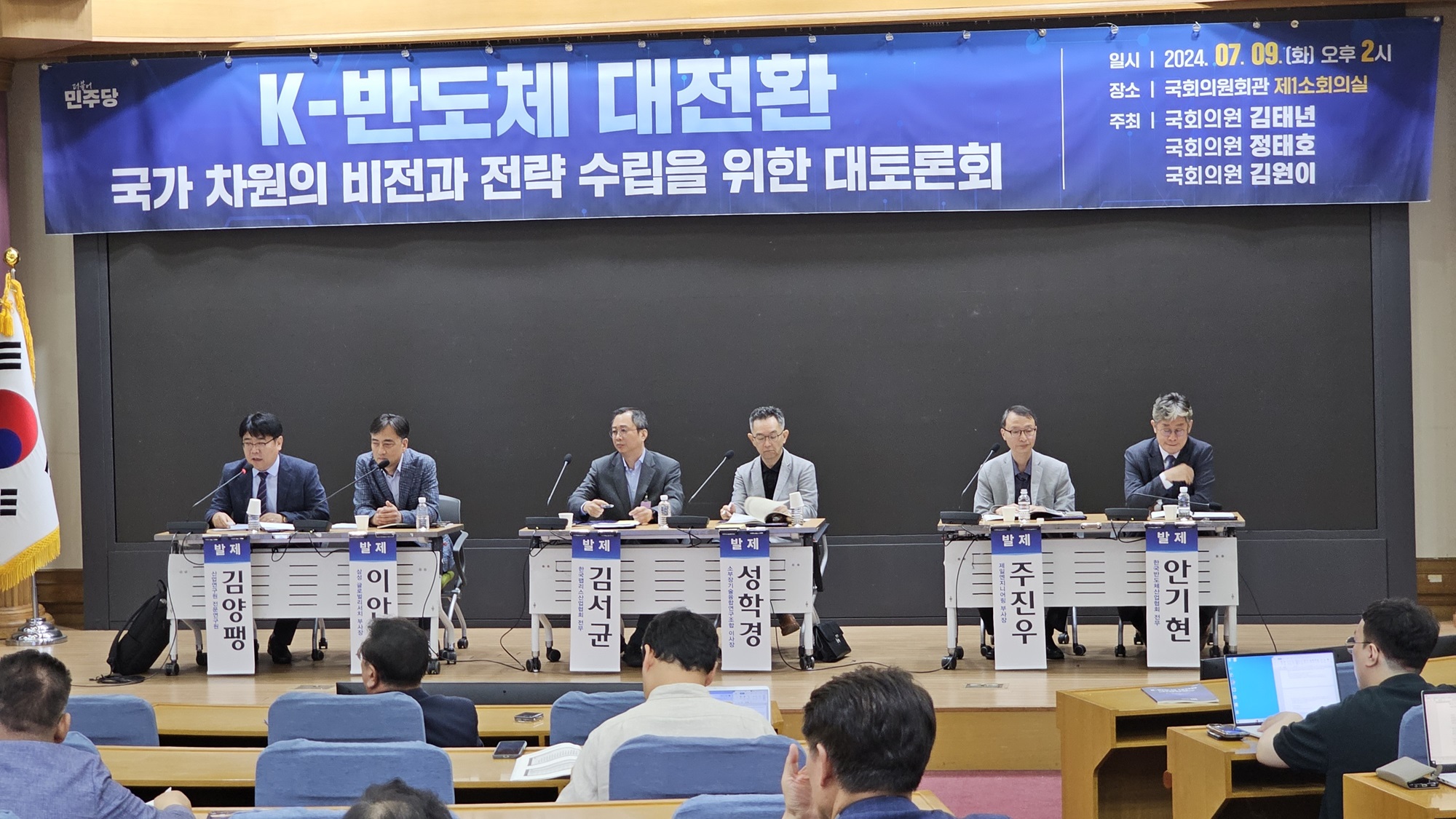
▲K-반도체 대전환 국가차원의 비전과 전략 수립을 위한 대토론회
보조금·세제·인프라 지원 경쟁국 수준 必
팹리스, 반도체서 분리해 산업축 육성 공감
“신재생에너지 없는 용인 클러스터 불가능”
반도체 산업 대전환이 몰아치는 가운데 반도체 업계 주요 관계자들이 한데모여 정부 정책 지원 촉구에 한목소리를 냈다.
9일 국회의원회관 제1소회의실에서 'K-반도체 대전환 국가차원의 비전과 전략 수립을 위한 대토론회‘가 김태년 국회의원실 주관으로 열렸다.
이날 토론회에는 △김양팽 산업연구원 전문연구원 △이안재 삼성글로벌리서치 부사장 △김서균 한국랩리스산업협회 전무 △성학경 소부장기술융합연구조합 이사장 △주진우 제일엔지니어링 부사장 △안기현 한국반도체산업협회 전무 등이 발표 연사로 참여해 반도체 산업계 현안들에 대해 발제했다.
△반도체 산업 국내외 동향 및 전망 △반도체 산업 글로벌 경쟁력 강화 정책 제안 △팹리스 산업 육성 미래전략 제언 △반도체 산업 동반성장을 위한 소부장 육성 방안 △RE100 이행을 위한 신재생에너지 공급 방안 △반도체 주권 확립 위한 국가 지원정책 방향과 과제 등에 대한 아젠다 등 발제 발표가 이어졌다.
이안재 삼성 글로벌리서치 부사장은 “보조금·세제·인프라 지원을 경쟁국과 동일한 수준으로 상향해야 한다”면서 “용수, 전력 등에서 인프라를 지원해 수출원가 수준에서 글로벌 기업들과 경쟁 가능하게 지원할 필요가 있다”고 제언했다.
또한 기술유출 단속을 강화할 것을 주문했다. 올해부터는 상향된 양형기준 적용이 오는 8월부터 예정돼 있어 기술유출 범죄에 대해 최대 18년형이 적용되지만, 이 부사장은 “그럼에도 벌금형 등 처벌 수위는 미국·일본·대만 대비 약한 수준”이라고 토로했다.
팹리스 업계에서는 시스템반도체를 반도체 산업과 분리해 하나의 산업축으로 키워야 한다는 발언에 공감했다. 김경수 팹리스산업협회 회장은 “파운드리 중심으로 정부 지원이 지금까지는 핵심이었다”면서 “이제 파운드리가 잘 돌아가려면 시스템반도체에서 좋은 아이디어로 글로벌 진출하는 기회가 있어야 파운드리부터 팹리스까지 경쟁력 갖출 수 있다”고 강조했다.
이날 장내 제안으로 한 패널이 “여야 협의체 만들어 적어도 8년 마스터플랜·로드맵 구축, 인력양성특별위원장에 정부 관계자가 아닌 기업 관계자를 임명, 중소·중견 기업을 위한 공용 팹 마련” 등을 목소리 높였다.
이에 안기현 전무는 “현재 공용 팹을 기획해 정부 심사를 받는 중”이라면서 “결과가 나오면 하반기 발표될 것”이라고 답변했다.
김태년 국회의원은 개회사에서 반도체 혁신을 위해 4가지 대원칙을 제시했다. 김 의원은 △반도체 국가위원회 및 국회 반도체 특별위원회 조속 가동 △반도체 기금 조성과 특별 회계 100조원 규모 효과의 정책 자금 방안 발표 등으로 전례 없는 지원 △팹리스, 소부장 등 생태계 조성 △RE100 마련해 신재생에너지 지원으로 반도체 산업 성장 도모 등을 거론했다.
아울러 조인철 의원은 “세제 및 금융 지원을 비롯해 직접 지원까지 논의해야 된다”고 강도 높은 의견을 내세웠으며, 정태호 의원은 “그린 반도체가 화두로 떠올랐는데 구축되고 있는 국내 삼성 팹은 10기가와트 전력이 필요한 상태”라면서 “활용할 수 있는 신재생에너지가 없이 용인 클러스터 구축이 가능한가”라며 의문을 제기했다.
